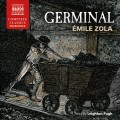The NAB Blog
Naturalism and Zola’s Germinal
By Anthony Anderson
1 July 2015
 Unsurpisingly, given its primary theme of class struggle, Zola’s Germinal has been appropriated by the socialist movement as an introduction to its political ideas. The novel is actually the thirteenth of twenty interconnected novels collectively known as Les Rougon-Macquart, which portrayed France under the Second Empire (1852–70). Adelaïde Fouque is the progenitor of the main characters in the books, having produced one child legitimately by Pierre Rougon and two illegitimately by the smuggler Macquart. The ‘hero’ of Germinal is Etienne Lantier, an idealist and socialist, descended from the Macquart side of the family.
Unsurpisingly, given its primary theme of class struggle, Zola’s Germinal has been appropriated by the socialist movement as an introduction to its political ideas. The novel is actually the thirteenth of twenty interconnected novels collectively known as Les Rougon-Macquart, which portrayed France under the Second Empire (1852–70). Adelaïde Fouque is the progenitor of the main characters in the books, having produced one child legitimately by Pierre Rougon and two illegitimately by the smuggler Macquart. The ‘hero’ of Germinal is Etienne Lantier, an idealist and socialist, descended from the Macquart side of the family.
Les Rougon-Macquart bears obvious and conscious similarities, but also some important differences, to Balzac’s La Comédie humaine series of novels. Zola extends the realism found in Balzac to what he himself called naturalism. In a sense, this was simply a reaction to the escapism and ‘unrealism’ of romantic writers and was characterised by the depiction of the novel’s characters with both accuracy and objectivity. Zola, in his research for the novel, observed mining conditions in some detail, visiting mining towns in Northern France and even witnessing a strike. In Germinal he is generally successful in integrating such detail into the fabric of the novel, as opposed to offering long set-piece descriptions.

Germinal is read for Naxos AudioBooks by Leighton Pugh
Zola’s naturalistic approach means that his characters are subject to a range of forces outside their control – social, economic and biological. Principally, heredity and environment shape human behaviour in his portrayal of characters. Additionally, his characters tend to represent a particular stereotype rather than being remarkable individuals in their own right. The naturalism also extended to sexual matters, where his frankness on such themes inevitably led to shock and some works being outlawed in certain parts of the world.
In an earlier novel, L’Assamoir, Zola created a portrayal of the working classes, but it is only in Germinal that class struggle comes to the fore. Etienne Lantier, on the point of starvation, finds work pushing coal carts inside the mines of Montsou. When the owners of the mines decide to reduce pay for each cart of coal, the miners strike, led by Etienne. The feeling of despair gradually descends into a doom characterised by starvation, violent subjugation and desperate behaviour.
Notwithstanding its bleak subject matter, Germinal remains without doubt one of the most popular novels of French literature. In our new audiobook Leighton Pugh, who read the unabridged Diary of Samuel Pepys for Naxos, gives an absorbing reading of this unmissable novel.
Anthony Anderson
Managing Director, Naxos AudioBooks
« Previous entry • Latest Entry • The NAB Blog Archive • Next entry »